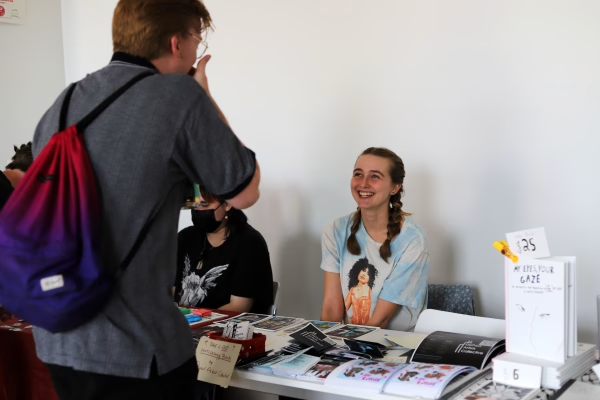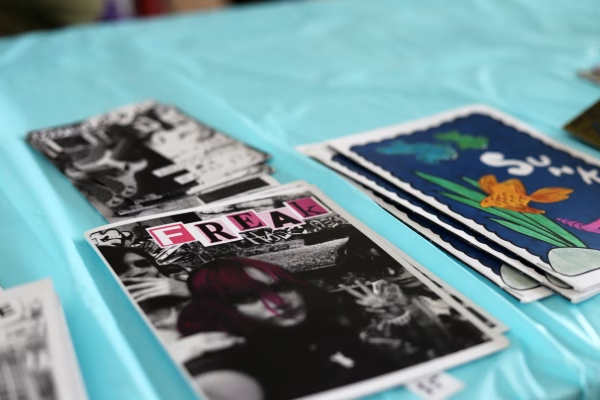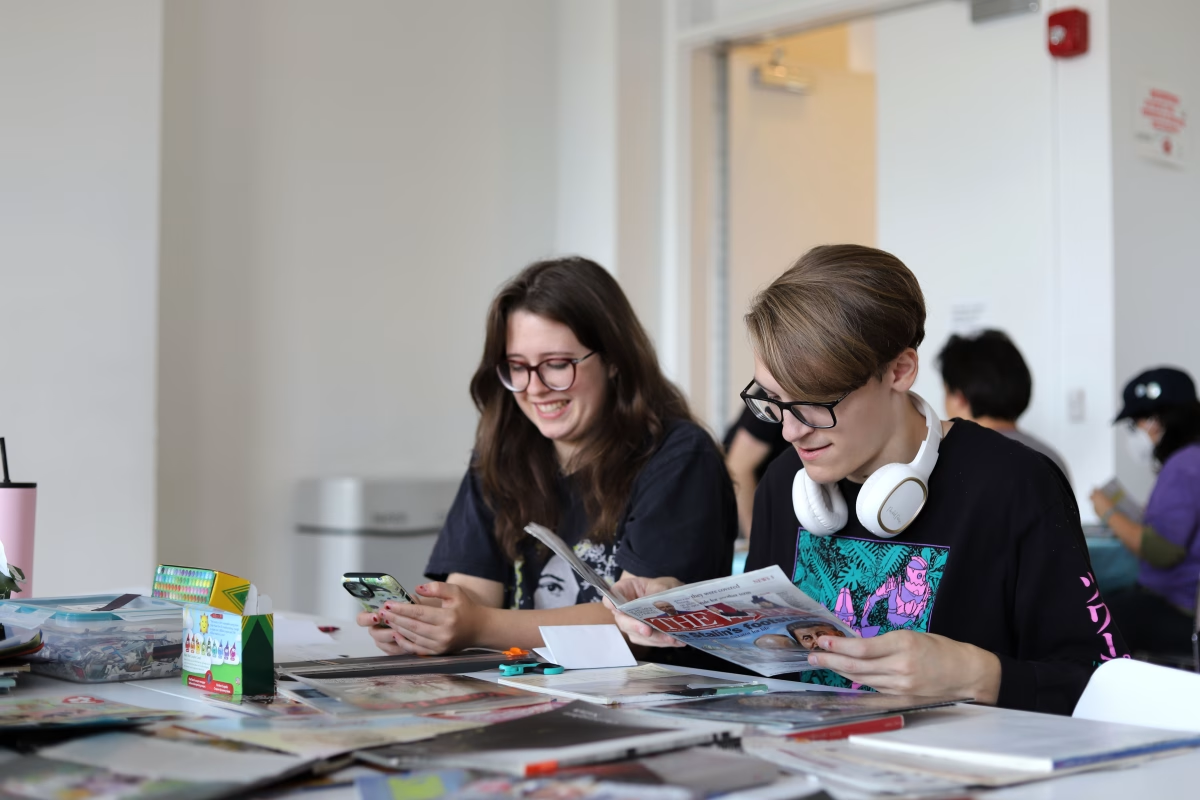Flipping through zines made of digital collages and magazine clippings, DePaul junior and art major Sophia Petridis displayed their goth-inspired artwork on their table. Covering themes like kink, sexuality and Riot Grrrl history, Petridis exhibited their zines and prints at DePaul’s ZineFest event.
ZineFest, held at the DePaul Art Museum and organized by the DePaul Zinesters Club, featured self-published zines, prints and other work of art from those tabling the event. Artists sold and traded their work — primarily zines, collages, comics and original drawings. DePaul Zinesters also provided collage materials for visitors to create their own zines.
Zines consist of small self-published works and provide a platform for unopposed self-expression for creatives, uplifting marginalized voices while remaining open to those with varying artistic talents.
“They’re super accessible,” Petridis said. “Zines are a good art form even if you don’t think you have artistic talent. You can play around with cutting things out of a magazine and throwing them together. It’s a good way to explore.”

Petridis’ work was inspired by the zines created during the Riot Grrrl movement in the ’90s. The movement centered itself around third wave feminist ideologies in punk music. Female-driven bands led Riot Grrrl and discussed feminist themes through music and zines.
Zines existed before the movement, gaining popularity through punk and other alternative music-based subcultures beginning in the ’70s. As the alternative music scene evolved to harbor more female artists, zine creators began taking on misogyny and other social issues in their work.
“I started by calling out the misogyny and sexism I saw in my own life,” Petridis said. “That’s why I was inspired by the Riot Grrrl writers.”
Danny Paeff, a student at the School of the Art Institute of Chicago, also featured his zines at the festival. His zines contained original drawings with an emphasis on queerness and divinity.
“I wanted to explore queer romantic relationships with a divine lens and how dealing with those ideas impacts relationships,” Paeff said.
These topics found their way into Paeff’s zines in numerous ways, allowing him to reimagine Biblical characters like Adam and Eve through a queer lens while also providing religious criticism.
“Zines are a way for me to work out how I feel about topics,” Paeff said. “Zines, and comics in general, are great because you can put so much on a page without it having to make sense. It just has to be on the page, and that helps me create zines.”

Zines provide individuals with a medium for self-expression, but they also contribute to the larger art community — and also make art more accessible, Paeff added.
“The art community has a huge accessibility issue where reproducing an item is frowned upon,” Paeff said. “Zines are an important part of destigmatizing and creating your own space in a community that’s often gatekept and distant from the public.”
Representatives from other organizations, like DePaul’s literary magazine Crook & Folly and the DePaul Artists Collective, also created zines for the event, fostering the relationship between the DePaul Zinesters and other creative groups at DePaul.
Meredith Anderson, a DePaul junior majoring in art, created zines to publicize Crook & Folly at the event, although she also brought personal zines to the festival.
“I’m inspired by the art community at DePaul and being surrounded by other creative people,” Anderson said, noting that zines also give people a way to sell their creative work.“It’s soothing to put ideas I have in my head down into a visual format that I can share with other people.”
DePaul senior Mari Williams does not create zines herself, but she did note their impact on the DePaul Artists Collective.
The DePaul Zinesters host meetings on Tuesdays and Thursdays from 6 to 8 p.m. at the IRL2 Lab on the Lincoln Park campus.
“Events like this bring people together,” Williams said as she browsed the wide selection of zines on display. “You don’t have to think about overcomplicating your art. It’s somewhere you can be yourself. You can make a zine out of anything and be a part of the community.”
Related Stories:
- Campus Cookout: DePaul says ‘Welcome Black’ to students
- Doctor Who Club regenerates into the new quarter
- ‘Degenerate’ market showcases taboo materials not easily found in public
Support Student Journalism!
The DePaulia is DePaul University’s award-winning, editorially independent student newspaper. Since 1923, student journalists have produced high-quality, on-the-ground reporting that informs our campus and city.
We rely on reader support to keep doing what we do. Donations are tax deductible through DePaul's giving page.


